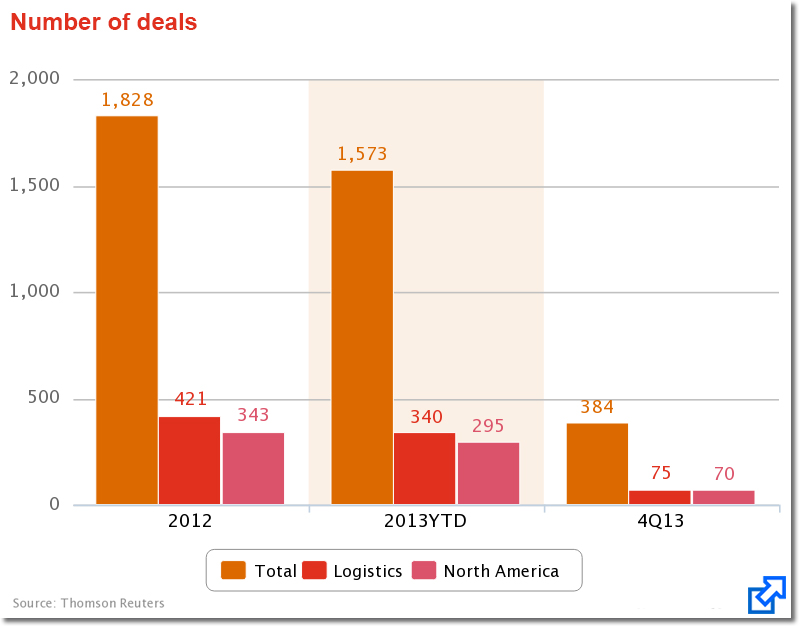PwC Reports Transportation and Logistics M&A Activity Finishes Strong in 2013
The fourth quarter of 2013 was robust by recent historical standards, with the second highest quarterly deal volume and value totals of the last three years.
Merger and acquisition (M&A) activity in the transportation and logistics sector in the fourth quarter of 2013 fared well, posting the second highest quarterly deal volume and value in the last three years, even though 2013 overall deal volume and value did not fare nearly as well, according to Pricewaterhouse Coopers’ (PwC) report, “Intersections: Fourth Quarter 2013 global transportation and logistics industry mergers and acquisitions analysis.”
Deals cited by PwC in the Intersections report represent all announced deals for the quarter-as opposed to completed deals only-and the report does not parse out deals that are withdrawn, intended, or pending.
PwC reported that the fourth quarter saw a 57 percent increase in deal volume, with deal value up more than 100 percent. Fourth quarter deal value—for deals valued at $50 million or more—was $23.2 billion and represents 66 announced deals with an average deal value of $352 million, compared to 42 deals representing $10.7 billion in total value in the third quarter of 2013 and 68 deals totaling $26.5 billion in the fourth quarter of 2012.
For all of 2013, PwC reported that there were 185 deals valued at $50 million or more, totaling $65.2 billion, which is 19 percent off of total 2012 value.
PwC U.S. transportation and logistics advisory leader Jonathan Kletzel said in the report that as momentum picked up in the second half of 2013 there was an uptick in fourth quarter deal volume and value, which could translate into more deal making activity, due in part to an ongoing global economic expansion and global industrial production. But he cautioned that acquirers need to exercise caution and remain focused on small, local deals, with more easily-achievable synergies, adding that valuations are expected to remain on the high side because of competition for favored assets like the potential supply of infrastructure-related deals.
“There were a significant amount of large infrastructure deals in the fourth quarter which contributed to the strong finish to 2013,” said Michael Portnoy, industry analyst with PwC’s transportation & logistics practice. “However there can often be a fair amount of volatility in deal totals from quarter to quarter, and there was not a common reason for the timing of these announcements.”
What’s more, looking at most of the 11 “mega deals”––at $1 billion or more––in 2013, the report said infrastructure accounted for most of these types of deals, specifically for airport and port assets.
Local market activity paced total fourth quarter deal activity at a 71 percent clip, with PwC observing that the proportion of local market volume hit a ten-year high in 2013.
Portnoy explained that there are multiple drivers regarding the increase of local market deals: risk-aversion, as acquirers are tending to focus more on deals with easier-to-achieve synergies (which tend to be local deals in which overlap already exists); and the shift in activity toward emerging markets, where local deals tend to be more common as the domestic industries are more fragmented and need to consolidate as their markets mature.
Local market deals occurred at a relatively high level in Asia and Oceania in the fourth quarter and in all of 2013, with the U.S. and Eurozone below pre-financial crisis levels. For the latter areas to regain traction, Portnoy said that stronger economic performance would be welcome, as there tends to be a positive correlation between economic output and transportation and logistics M&A over time. And he pointed out that during the pre-recession period, capital markets were more accommodating regarding debt financing as easier credit availability could help spur deal activity in these regions.
One area that PwC said appears “ripe” for consolidation in the future is trucking and logistics.
“Trucking and logistics are more fragmented than most other US transportation modes,” noted Portnoy. “For example, railroads have been highly consolidated for some time and airlines just went through a wave of consolidation in recent years. Trucking and logistics have relatively low barriers to new M&A and, since trucking tends to under perform most other modes on the basis of profitability, M&A can help improve the overall performance.”














